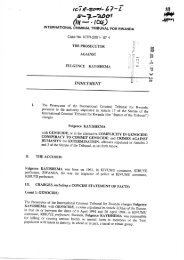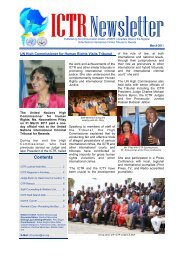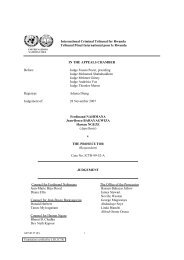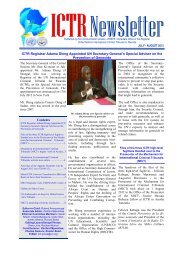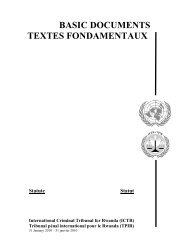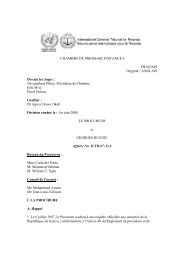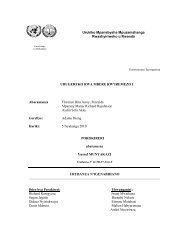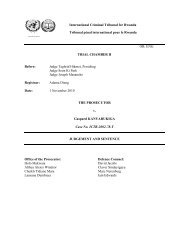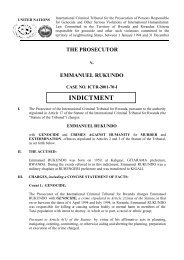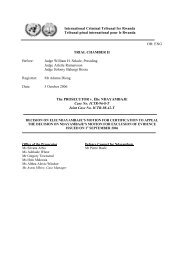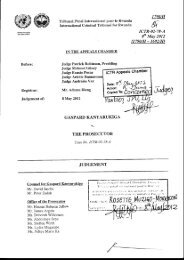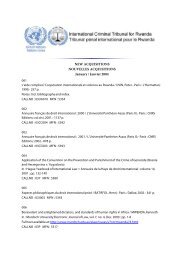Report of Proceedings - International Criminal Tribunal for Rwanda
Report of Proceedings - International Criminal Tribunal for Rwanda
Report of Proceedings - International Criminal Tribunal for Rwanda
Create successful ePaper yourself
Turn your PDF publications into a flip-book with our unique Google optimized e-Paper software.
criteria to determine whom, in the words <strong>of</strong> Security Council, “played a leading role in the<br />
genocide <strong>of</strong> <strong>Rwanda</strong> or who committed a serious violation <strong>of</strong> the law”; the ICTR held a<br />
workshop <strong>of</strong> senior trial attorneys. Nevertheless, with the decision on the Completion Strategy<br />
by the Security Council, ICTR had to in February 2004 focus on the issue <strong>of</strong> selecting cases <strong>for</strong><br />
prosecution.<br />
Once faced with the deadlines, the OTP had to conscientiously determine what cases to<br />
retain, prosecute, transfer or discontinue. It was concluded that three factors were critical: the<br />
status <strong>of</strong> the accused in <strong>Rwanda</strong> at the time (e.g., whether he was senior military or government<br />
figure?) and the extent <strong>of</strong> his or her participation. Geographic spread was also established as a<br />
consideration, so as not to exclude certain parts <strong>of</strong> the country. That could give rise to issues <strong>of</strong><br />
discriminatory selection and impede the prospects <strong>for</strong> national reconciliation. A third factor<br />
was the nature <strong>of</strong> the <strong>of</strong>fence itself. Offences <strong>of</strong> sexual violence or those directed against<br />
children would, where the evidence and the law permitted, be given priority in prosecution.<br />
The prolonged nature <strong>of</strong> the investigations, ongoing ten years after the event, and due to<br />
conclude only by end <strong>of</strong> 2004 posed a challenge to prosecution. Investigations <strong>of</strong> such crimes,<br />
face many challenges but nonetheless with the lapse <strong>of</strong> time questions as to quality <strong>of</strong> results<br />
may arise.<br />
Unlike in the ICTY, the ICTR Bureau should not have a role in deciding whether an<br />
indictment will go <strong>for</strong>ward <strong>for</strong> confirmation. The Bureau does not have access to sufficient<br />
in<strong>for</strong>mation, such as the entire database <strong>of</strong> targets to enable it determine what cases are more<br />
serious than others.<br />
Only the Prosecutor who is aware <strong>of</strong> the entire data base is in a position to do so. The<br />
arrangement also raises constitutional questions relating to the exercise <strong>of</strong> the Prosecutorial<br />
discretion.<br />
At present, multiple-accused cases are posing a great challenge <strong>for</strong> the court. There<strong>for</strong>e, the<br />
OTP is moving toward single-accused cases. Existing multiple-accused cases have been<br />
ongoing <strong>for</strong> years and remain unfinished. In such cases, there are multiple defence counsels<br />
and witnesses. This <strong>of</strong>ten leads to more delays due to the absence <strong>of</strong> one or more <strong>of</strong> the actors.<br />
Current policy has as a result shifted to the strategy <strong>of</strong> single accused cases which tend to<br />
proceed more quickly. The new indictment policy also requires that be<strong>for</strong>e an indictment is<br />
submitted <strong>for</strong> confirmation, all steps must be taken to ensure that the case is trial ready upon<br />
confirmation.<br />
In order to maintain a unified case theory <strong>of</strong> the genocide, the OTP needs to improve coordination<br />
among trial teams. With nine trial teams, all headed by enthusiastic senior trial<br />
attorneys, this has been a challenge. Staff must avoid taking conflicting positions with regard<br />
to the overall case theory. The position taken by one trial team should not hurt another.<br />
It is quite easy to fall into, the error <strong>of</strong> dealing with each <strong>of</strong> the trials at the ICTR as an<br />
isolated case. Whereas in truth there was a single genocide. All the cases are merely intended<br />
15




